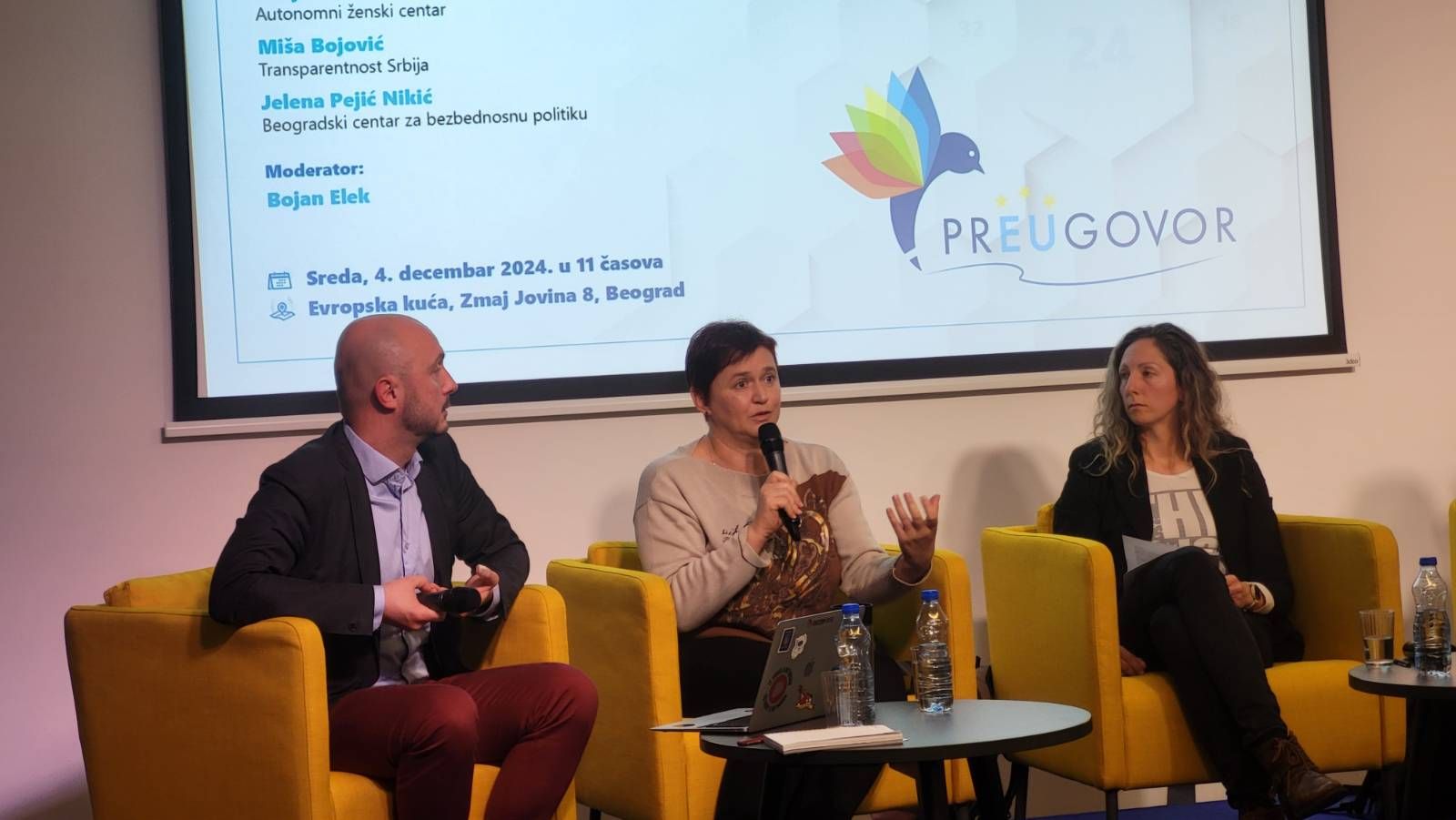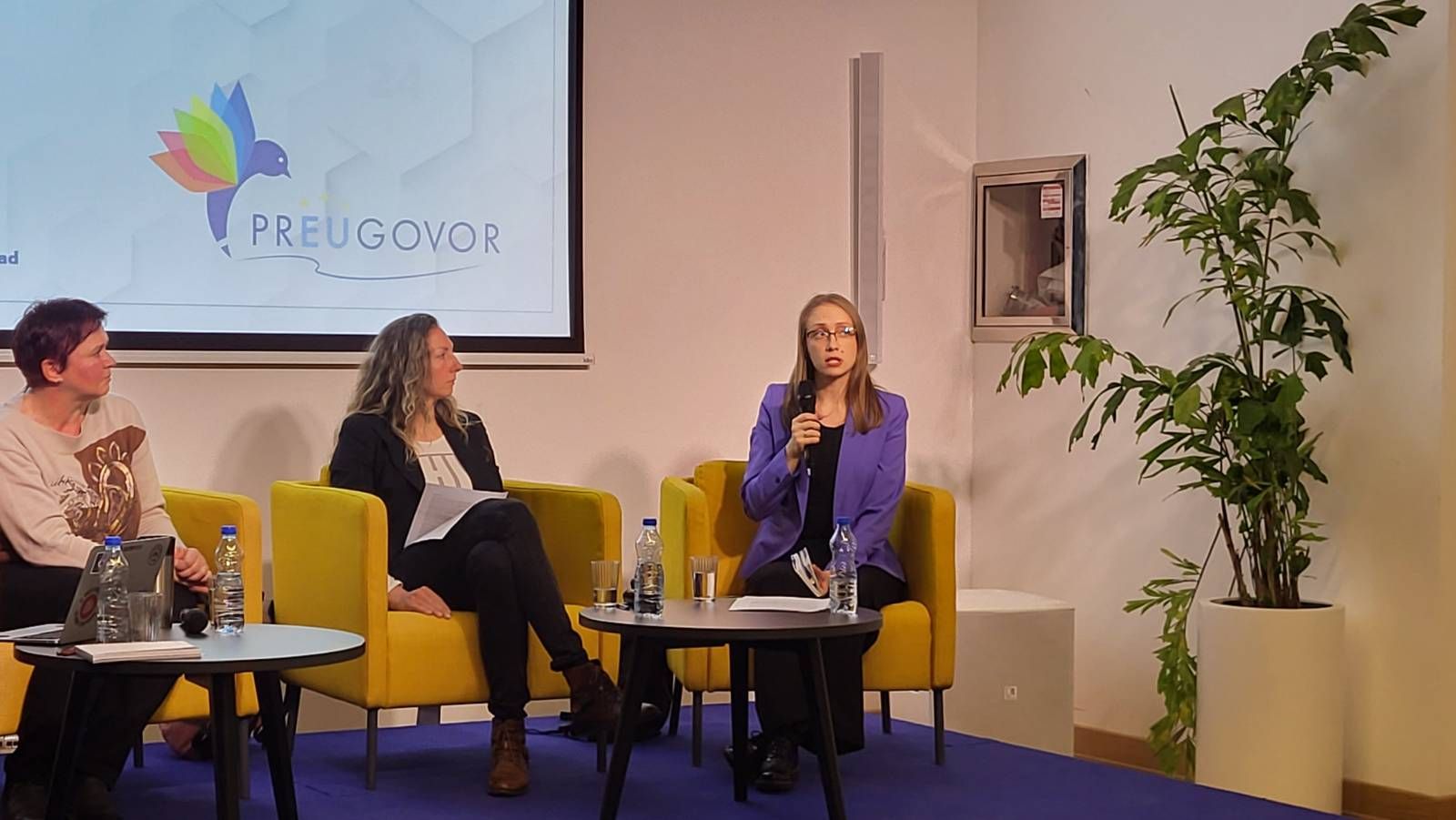There can be no quality reforms in an environment of growing societal polarization and government repression of dissenting voices. Civil society is striving to at least prevent the adoption of harmful solutions. In the narrative on European integration, economic topics have overshadowed the rule of law, without which there can be no progress in the accession process, warned participants at the presentation of the 23rd prEUgovor Alarm Report on 4 December at the European House in Belgrade.
At the beginning of the conference, moderator Bojan Elek pointed out that the latest European Commission report from October shows minimal progress in Serbia. This assessment largely aligns with the findings of the prEUgovor coalition report, which examines some areas in greater detail and with sharper criticism. Elek reminded the audience that the new European Commission had announced an intensification of the enlargement process, but significant progress is hard to expect without genuine reforms in the country.
According to him, the panel's key topics included the Reform Agenda and Growth Plan in regard to the Fundamentals, with a particular focus on the functioning of parliament, amendments to criminal legislation, the position of civil society, and the fight against corruption.
No Debate Anymore: Escalation of Negative Parliamentary Practices
Miša Bojović from Transparency Serbia stated that despite attempts to improve the work of parliament in its new session, no real progress has been made. She highlighted that a recent brawl in parliament reflects an escalation of previous poor conditions and worrying practices.
“For instance, the budget for the upcoming year was adopted without debate. The session during which it was supposed to be discussed lasted barely over three hours, including breaks, and featured as many as 68 items on the agenda,” Bojović explained. She concluded that the degradation of parliament’s role continues, with the institution merely rubber-stamping government decisions without discussion.
Bojović also addressed the slightly improved assessment of the fight against corruption in the latest European Commission report. Some progress is noted due to the adoption of the 2024-2028 Anti-Corruption Strategy. However, the Commission did not examine the content of this strategy, which Bojović described as a cosmetic move by the government. She emphasized that the strategy fails to address major issues such as lack of transparency, circumvention of domestic regulations regarding major infrastructure projects, and the passivity of the prosecution.
Amendments to Criminal Legislation: Instead of Reforming, We Are Stuck in Damage Control
Vanja Macanović from the Autonomous Women’s Center spoke about amendments to criminal legislation, noting that the lengthy drafting process lacked transparency. Although discussions on amendments to the Criminal Code began in 2021, the topic suddenly appeared on the agenda this year in a rushed process.
There was no time to consider everything, as the amendments are extensive. Furthermore, amendments to the Code of Criminal Procedure, which are very significant in this context, must not be overlooked, Macanović stressed.
The Alarm report lists the most contentious provisions of the proposed amendments, including the undermining of prosecutorial investigations and victims' rights, vague definitions of new criminal offenses, introducing thresholds for the offense of abuse related to public procurement, and expanding police powers to the Security Information Agency (BIA).
“Since 2016, we’ve constantly been working to prevent further harm - to stop the erosion of existing rights. In such conditions, it’s very difficult to propose anything new, although amendments and updates to many laws are urgently needed,” Macanović said.
She noted that public consultations lasted only a month, after which some of the amendments were passed in parliament without discussion, in a special proposal submitted by a group of ruling party MPs. The good news, she said, is that the Ministry of Justice eventually agreed to continue discussions next year and to introduce unauthorized sharing of intimate recordings as a new criminal offense, a small victory for civic activism.
The Government Tolerates No Criticism, Neither in Institutions Nor on the Streets
Jelena Pejić Nikić, editor of the Alarm Report and researcher at the Belgrade Centre for Security Policy, discussed the position of civil society. She highlighted dissatisfaction among civil society organizations regarding how the government involves them in formal processes, noting that the reality in which they operate is far more challenging.
According to her, even when the government includes civil society organizations in formal bodies, it subsequently obstructs their work. For instance, the government delayed the work of the Council for Creating an Enabling Environment for Civil Society for months by failing to appoint its representatives. Similarly, the ruling majority obstructed the work of the Working Group for Improving Electoral Conditions, which included representatives of three organizations. Civil society was also not consulted during the drafting of the Reform Agenda.
Pejić Nikić also warned about media smearing of civil society organizations, arrests of activists, and the alarming proposed amendments to the Criminal Code that threaten freedom of expression and assembly. She pointed out that some domestic activists and civil society representatives were detained at borders without justification, which revealed the existence of a list of "undesirable" foreign nationals. Moreover, she stated that Serbia assists other authoritarian regimes in suppressing their critics. She also warned of dangers in the recent Draft Law on the Special Register of Foreign Influence Agents.
Pejić Nikić also addressed the topic of police reform and acknowledged some positive developments, such as the prioritization of operational independence of the police from the Ministry of Internal Affairs in the Reform Agenda, the announcement of a competition for a police director after nearly three years, and the resolution of illegal acting position heading the Internal Affairs Sector of the Ministry. However, she emphasized that poor practices persist due to the lack of accountability for police officers involved in excessive use of force and abuse in custody, even in cases closely monitored by the public.
The video of the conference is available only in Serbian.




